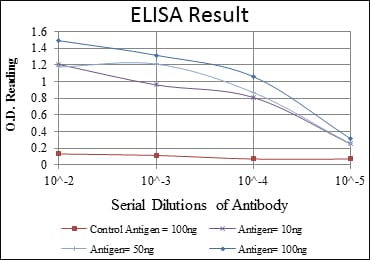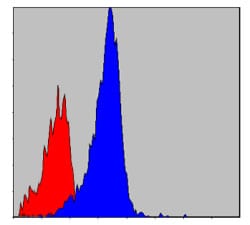

| WB | 咨询技术 | Human,Mouse,Rat |
| IF | 咨询技术 | Human,Mouse,Rat |
| IHC | 咨询技术 | Human,Mouse,Rat |
| ICC | 技术咨询 | Human,Mouse,Rat |
| FCM | 1/200 - 1/400 | Human,Mouse,Rat |
| Elisa | 1/10000 | Human,Mouse,Rat |
| Aliases | CRKL |
| Entrez GeneID | 1399 |
| clone | 5E12 |
| WB Predicted band size | 39kDa |
| Host/Isotype | Mouse IgG1 |
| Antibody Type | Primary antibody |
| Storage | Store at 4°C short term. Aliquot and store at -20°C long term. Avoid freeze/thaw cycles. |
| Species Reactivity | Human |
| Immunogen | Purified recombinant fragment of human CRKL expressed in E. Coli. |
| Formulation | Ascitic fluid containing 0.03% sodium azide. |
+ +
以下是3-4篇关于CRKL抗体的参考文献及简要摘要:
---
1. **文献名称**: *"The CRKL adaptor protein is required for type I interferon-dependent gene transcription and antiviral immunity"*
**作者**: K. Sasaki et al.
**摘要**: 研究利用CRKL抗体进行免疫共沉淀和Western blot分析,发现CRKL在I型干扰素信号通路中通过连接STAT蛋白与转录复合物,调控抗病毒相关基因表达,缺失CRKL会削弱宿主抗病毒反应。
---
2. **文献名称**: *"CRKL mediates p110β-dependent PI3K signaling in PTEN-deficient glioblastoma"*
**作者**: Y. Zhu et al.
**摘要**: 通过CRKL抗体抑制实验和免疫荧光技术,揭示CRKL在PTEN缺失的胶质母细胞瘤中通过激活PI3K-p110β通路促进肿瘤侵袭,提示其作为潜在治疗靶点。
---
3. **文献名称**: *"CRKL regulates osteoblast differentiation through the TGF-β and BMP signaling pathways"*
**作者**: J. Chen et al.
**摘要**: 使用CRKL抗体进行染色质免疫沉淀(ChIP),证明CRKL通过调控TGF-β/BMP信号下游的Smad蛋白磷酸化,影响成骨细胞分化及骨形成。
---
4. **文献名称**: *"Overexpression of CRKL correlates with poor prognosis in gastric cancer patients"*
**作者**: L. Wang et al.
**摘要**: 通过CRKL抗体的免疫组化分析胃癌组织,发现CRKL高表达与肿瘤分期、转移及患者生存率降低显著相关,提示其作为预后生物标志物的潜力。
---
这些研究均利用CRKL抗体探究其在疾病机制或信号通路中的功能,涵盖免疫、肿瘤及发育等领域。如需具体文献链接或扩展,可进一步检索PubMed或期刊数据库。
CRKL (CRK-like) antibody is a crucial tool in studying the adaptor protein CRKL, encoded by the *CRKL* gene in humans. CRKL belongs to the CRK protein family, characterized by Src homology 2 (SH2) and Src homology 3 (SH3) domains that mediate protein-protein interactions. It plays a pivotal role in intracellular signaling pathways, particularly in regulating cell proliferation, adhesion, migration, and apoptosis. CRKL acts downstream of tyrosine kinases, linking activated receptors (e.g., EGFR, BCR-ABL) to effectors like RAS-MAPK and PI3K/AKT pathways. Dysregulation of CRKL is implicated in cancers (e.g., leukemia, lung, and ovarian cancers), where overexpression or aberrant phosphorylation drives oncogenic signaling.
CRKL antibodies are widely used in research to detect CRKL expression, phosphorylation status, and interactions in cell lysates (via Western blot, IP) or tissue sections (via IHC/IF). They aid in exploring CRKL's role in disease mechanisms, therapeutic responses, and as a potential biomarker. Monoclonal or polyclonal CRKL antibodies are typically raised against specific epitopes (e.g., human CRKL N-terminal or C-terminal regions) and validated for specificity across species (human, mouse, rat). Researchers rely on these antibodies to investigate CRKL's involvement in pathologies, including its interaction with downstream targets like C3G, SOS1. and CAS. Quality validation (e.g., knockout cell controls) ensures antibody reliability for experimental reproducibility.
×